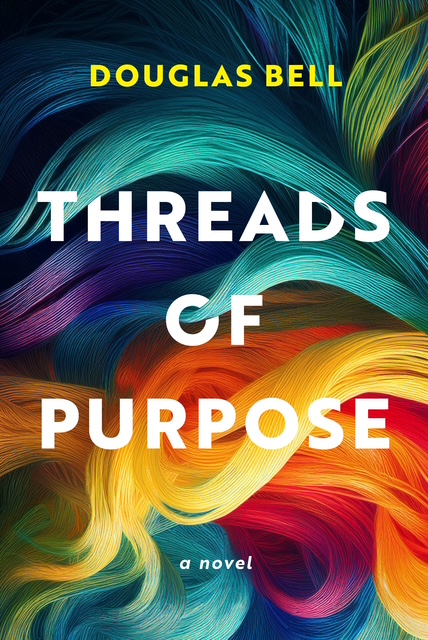About the Book, Threads of Purpose

Threads of Purpose
Author: Douglass Bell
Asher Tidwell never imagined his life would come to this—riding shotgun in a tinted-out SUV, delivering illicit pills to a high-stakes buyer in an upscale Houston neighborhood. Once a promising college football player, Asher now finds himself tangled in the dangerous ambitions of his best friend, Jim, a smooth-talking hustler who thrives on risk. But after a tense encounter with the police and unsettling signs that Jim’s recklessness is catching up to him, Asher begins questioning everything.
Struggling to break free from a cycle of poor choices, Asher is haunted by the creative passion he abandoned long ago—fashion design. Torn between survival and self-discovery, he wrestles with his past, the weight of his broken relationships, and the gnawing feeling that he’s meant for something more. As he navigates betrayal, ambition, and the consequences of his actions, Asher must decide: will he continue down a dangerous path, or will he dare to stitch together a new future, one thread at a time?
A gripping novel of identity, ambition, and redemption, Asher’s Threads explores the tension between survival and self-expression in a world where second chances are hard to come by.
Threads of Purpose Review
I was compensated with a small amount for my time and effort in reading the book and writing this review. However, all thoughts and opinions expressed are my own and are based on my honest personal experience reading the book. Nor did the publisher in any way, shape, or form ever pressure me to give a positive review.
In Threads of Purpose, Douglas Bell delivers a gripping, character-driven novel that follows Asher Tidwell, a former college football star turned overwhelmed medical resident, whose life begins to unravel as he gets caught up in the drug trade through his risk-addicted best friend, Jim. Struggling to make ends meet, Asher is torn between the survival-driven choices that have pulled him off course and the creative calling that he long ago buried: fashion design.
When a drug deal in an upscale Houston neighborhood goes sideways and lands him in jail, Asher is forced to confront the wreckage of his decisions, his buried traumas, and the life he truly wants to build. What unfolds is a powerful story of redemption, identity, and second chances as Asher begins the slow, difficult work of untangling himself from his past in search of purpose, love, and creative fulfillment.
One thing that I really enjoyed with this book is how it weaves a moving exploration of Black masculinity, ambition, and healing through the lens of one man’s internal battle to choose growth over destruction thread by thread. The concept of this was very interesting.
But aside from that, after reading the book by far what I ended up have most thoughts to say on is on Asher the protagonist himself. There are definitely a few things I agreed with Asher on, such as his values when it comes to relationships. I appreciated his openness toward relationships that aren’t strictly heterosexual and the whole debate on “older” and “younger” partners.
That said, there were also choices he made that I didn’t relate to at all, especially his involvement with drug dealing. I found it hard to root for him in those moments. The book isn’t completely bias in their portrayal for me to blindly sympathize with him, which I appreciated.
I also liked how the book showed Asher experiencing both oppression and privilege. It didn’t paint him just a a victim or purely advantaged, instead he’s a normal human being navigating a complicated intersection of race, class, and professional identity. Watching him come to terms with where he sits in that system, and how he benefits from some parts of it while being crushed by others, added depth to his character arc.
While the plot itself is engaging and holds the reader’s attention with a good balance of tension and emotional stakes, I felt that the book’s engagement with its underlying philosophical ideas could have gone deeper. The themes it touches on such as identity, personal growth, societal pressure, and redemption are compelling, but their execution often felt uneven.
In some instances, the ideas were introduced in a way that felt too surface-level, more gestured at than fully explored. In other places, philosophical threads were raised but not clearly articulated, which made it difficult to understand how they were meant to connect with Asher’s journey on a meaningful level.
One of the clearest examples of this is the book’s attempt to emphasis on Asher’s relationships and how they shape his worldview and personal development. This is clearly a central narrative aim, but many of these relationships didn’t feel fully fleshed out. They often seemed to exist more as symbolic placeholders than as fully realized emotional bonds.
The novel asks the reader to care deeply about certain connections in Asher’s life and to see them as transformative or defining, but when those connections are only briefly shown or left underdeveloped, it’s hard to feel the impact we’re told they’re meant to have.
For me, this made some of the emotional beats fall short. I could understand what the story was aiming for intellectually, but I didn’t always feel it on a visceral or emotional level. It’s an area of the novel that I think could benefit from more time, more dialogue, and more nuance. If these relationships were given more space to grow organically on the page, the philosophical and emotional throughlines would likely land with greater resonance.
Other than that though, the book was overall very solid! I think if any of the topics I’ve mentioned seemed interesting to you, it’s worth a shot to see if this book may be your next favorite read.

Leave a Reply